Jicama is a delicious root vegetable that is part of many nutritious dishes. Light apple aroma and sweetish starchy taste, tending to remind turnips, legumes, and pears at the same time… It allows you to use this vegetable raw or cook it in many ways. As you know, the best vegetables for keto are green and leafy ones. But can you eat jicama while on a low-carb diet? Is jicama keto?
Yes, jicama is keto in small amounts. It contains medium amounts of net carbs and high amounts of fiber. Jicama is also a source of many beneficial elements for your health, so feel free to add it to your keto diet in small amounts.
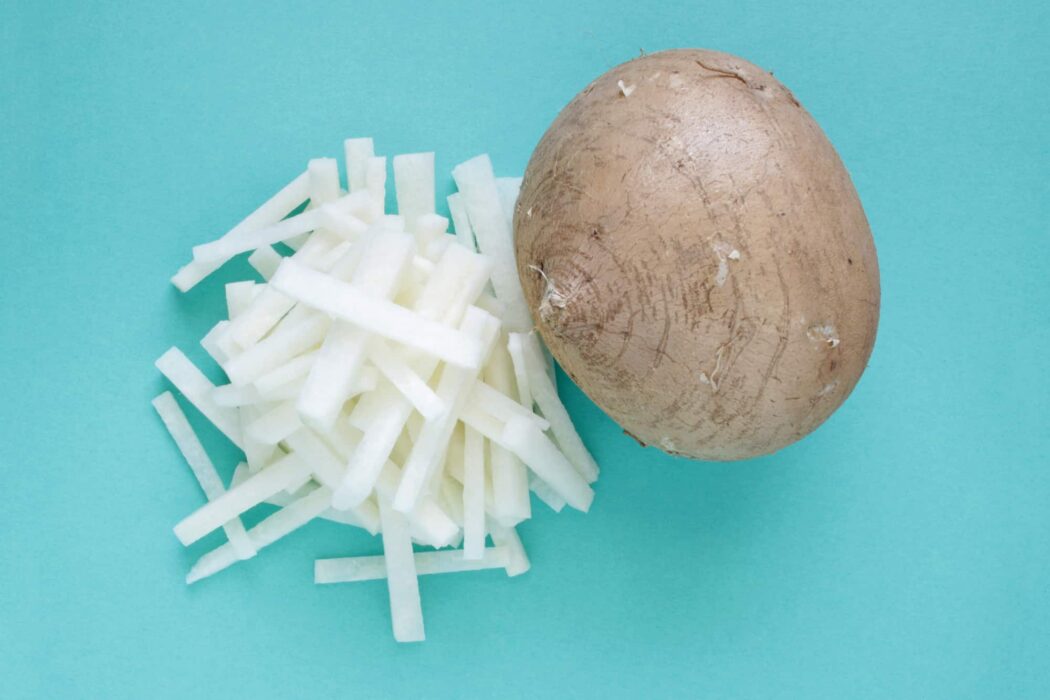
How many carbs are in jicama? What are the health benefits of this root vegetable? How to cook jicama on keto? You will find all the answers in this article. Keep reading to find out more!
What Is Jicama?
In the 16th century, the conquistadors discovered jicama. They tried to bring it to Spain and Portugal, but the climate of the regions significantly reduced the crop yield. The largest jicama grows in the tropical zone. Today, it is common in the tropics and in the Southern United States, China, and Southeast Asia.
Is Corn Keto: Main Reasons to Avoid It during Weight Loss
The only edible part of the plant is the tubers, which can grow up to 15 inches and weigh 1 to 3 pounds. They are covered with thin yellow skin and have crispy, creamy white, potato-like, or pear-like flesh. In appearance, they resemble turnips. Unfortunately, the leaves, stems, and pods of jicama are extremely poisonous due to the natural toxin rotenone used to produce pesticides and insect control agents.
Is Jicama Keto?
Now that we have figured out what jicama is let’s discuss its nutritional value. Is jicama keto? 100 grams of jicama pulp contain:
- 38 calories
- 0.7 grams of protein
- 0.1grams of fat
- 9 grams of carbohydrates
- 5 grams of fiber
- 4 grams of net carbs.
So yes, jicama is keto in small amounts. You can safely use one glass of raw or baked jicama as a side dish with meat or fish. Remember to count all net carbs and do not exceed 20 grams of net carbs per day.
Jicama is widely used in Mexican and Chinese cuisines. These root vegetables taste like raw potatoes, so you can eat them raw after peeling. I like to add spices or lemon juice and eat it as a snack. You can also boil jicama, bake in the oven, or grate. These root vegetables are tasty in salads, soups, side dishes, stews, various sauces, etc.
You can dry the jicama and then add it to salads and even keto desserts. My all-time favorite jicama recipe is slicing it like potatoes and making keto French fries in the oven or baking it for a tasty low-carb potato chips substitute. Sesame, butter and olive oils, herbs, bell peppers, carrots, and onions are best combined with jicama.
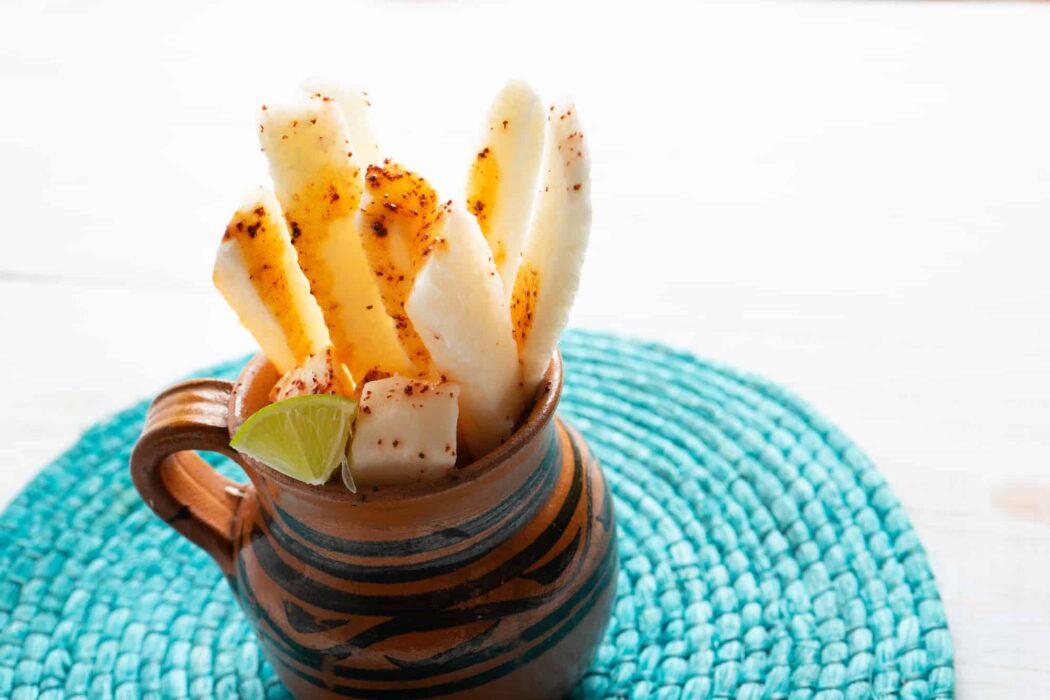
Jicama Health Benefits
Jicama consists of 85-90% water, but at the same time, it contains about 20 nutrients and trace elements. So let’s take a closer look at their effect on your body.
Vitamin A
The content of vitamin A in jicama roots is 21 mg per 100 grams, which almost completely covers an adult’s daily norm. This vitamin is required to maintain healthy skin, hair, nails, and normal metabolism. In addition, it promotes healthy protein synthesis, strengthens the immune system, and supports eye health.
The normal functioning of the immune system largely depends on vitamin A: an increase in the barrier function of the mucous membranes, an increase in the phagocytic activity of leukocytes, as well as other nonspecific factors affecting immunity. Vitamin A protects against flu, colds, respiratory tract infections, and prevents the occurrence of infections of the digestive tract and urinary tract.
Vitamin C
100 grams of jicama contain 20.2 mg of ascorbic acid – almost 25% of the daily norm. Vitamin C is necessary to speed up metabolism, strengthen blood vessels, enhance immunity, and vigorous physical activity. It speeds up wound healing and helps restore blood vessels, regulates blood formation, and maintains heart health. Vitamin C also participates in collagen synthesis, ensuring healthy tissue growth throughout the body.
Is Kale Keto? Main Benefits for Your Diet
Vitamin B3
The content of vitamin B3 in the plant’s roots is 1% of the daily value – 0.2 mg. It helps to fight diseases of the stomach and intestines and stimulates the normal functioning of the liver. In addition, this vitamin has a vasodilating effect on the small vessels (including the brain). It improves microcirculation, has a soft anticoagulant effect (increases the fibrinolytic activity of the blood).
Vitamin B3 helps oxidative reactions occur in all types of cells, reducing oxidative stress in your body. In addition, it synthesizes hormones, ensures healthy vision, and helps to assimilate protein from plant foods.
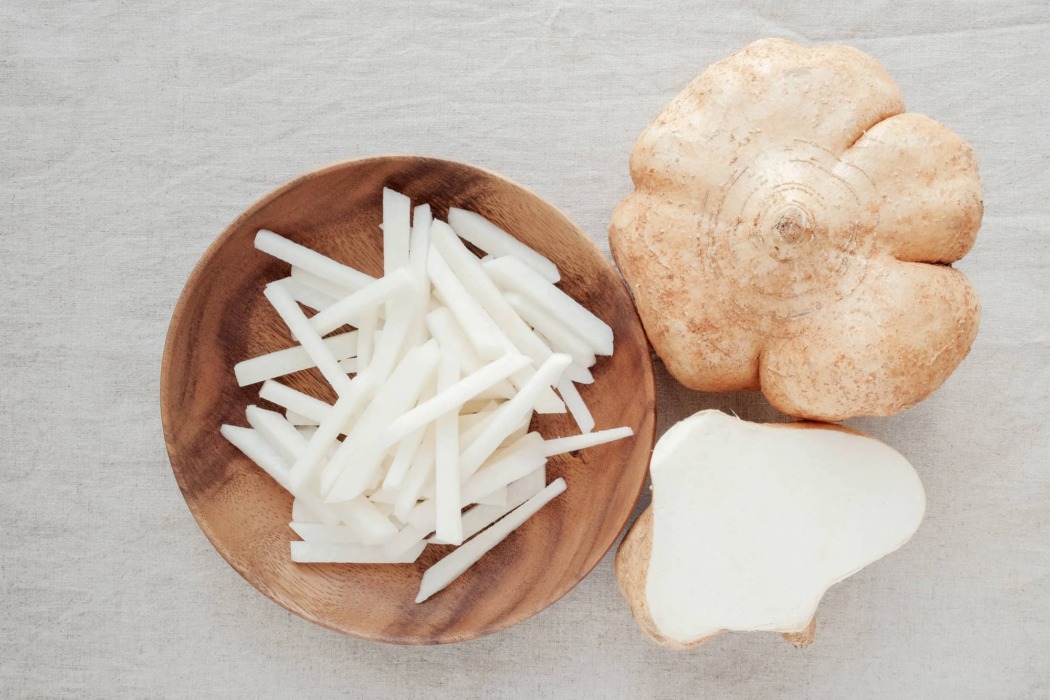
Vitamin B4
It is an essential element for maintaining mental performance, improving memory, and the health of the nervous and endocrine systems. Vitamin B4 improves liver function, cleanses it, and prevents the formation of gallstones. In addition, choline lowers the level of cholesterol and the concentration of fatty acids in the blood. It cleans the walls of blood vessels from cholesterol plaques. Jicama tubers contain about 13.6 mg of vitamin B4 per 100 g of product.
Vitamin B5
Pantothenic acid (vitamin B5) is involved in metabolism, stimulates the adrenal glands, and normalizes the stomach’s acidity. Vitamin B5 helps to synthesize fatty acids, cholesterol, hemoglobin, and so on. It has a positive effect on the metabolism of fats, proteins, and carbohydrates.
One of the main properties of vitamin B5 is producing adrenal hormones and also blood antibodies, which strengthen the immune system. Pantothenic acid plays a huge role in nourishing hair follicles, helping to maintain proper hair growth and reduce hair loss. Jicama contains about 0.14 g of Vitamin B5 per 100 g of pulp.
Potassium
The amount of potassium in jicama pulp is 150 mg or 12% of the daily intake of an adult. This mineral is responsible for the health and proper functioning of the whole body. It supports muscle tone and bone density, a healthy metabolism, normal blood pressure, and a healthy heart rate.
Potassium promotes quick thinking and mental clarity, improves oxygen supply to the brain, and helps eliminate toxins. In addition, it acts as an immunomodulator, helps lower blood pressure, and helps treat allergies. Potassium also gives our body the components it needs to provide energy during heavy physical activity.
Phosphorus
The phosphorus content in the pulp of jicama is 18 mg per 100 grams, which is almost a fifth of the daily value. Phosphorus is vital for bones’ normal structure and health. It is also good for improving mental performance and maintaining focus and memory. This element is essential for the normal structure of teeth and gums. Besides, phosphorus is essential for the body to produce energy, and to perform the functions of the muscular and nervous systems.
Phosphates play an important role in maintaining acid-base balance, ensuring proper functioning of the heart and kidneys, and participating in the storage and release of energy in cells throughout the body. With the help of phosphorus, your body forms proteins and carbohydrates, and it helps the absorption of many nutrients.
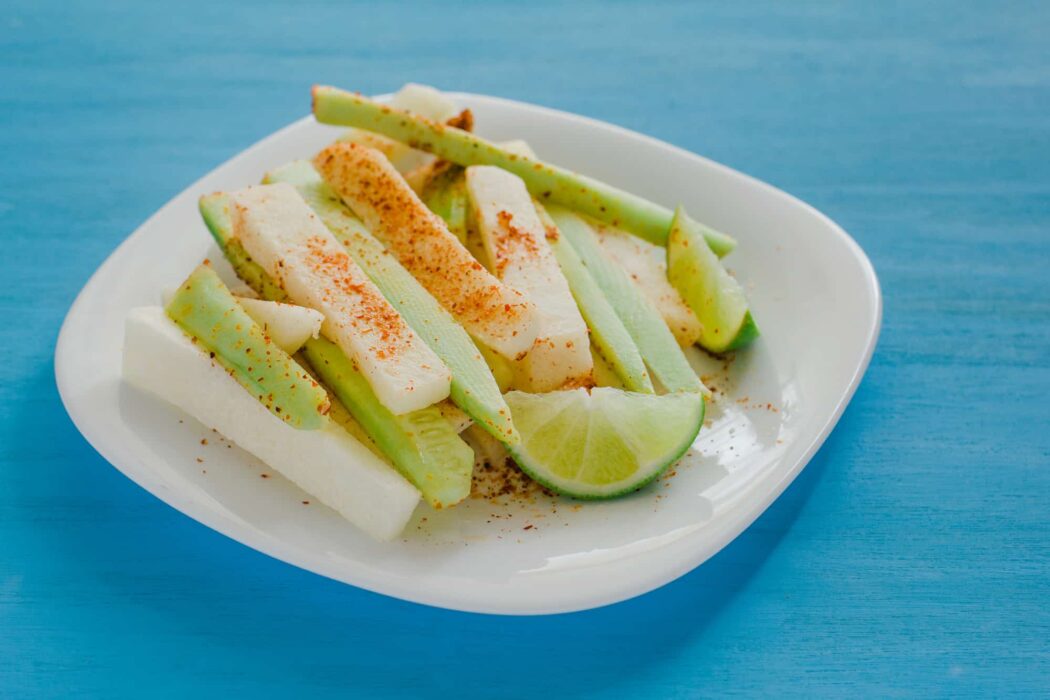
Sodium
Jicama contains 12 mg of sodium, which is 2.4% of the required daily value. This substance is necessary for a healthy cellular balance, maintaining an optimal blood composition, and normalizing water-salt metabolism. In addition, adequate sodium intake helps prevent over-fatigue, maintains a healthy nervous system, and helps promote healthy sleep.
Sodium supports and normalizes water balance, regulates acid-base balance, and ensures membrane transport. It supports the health of the nervous and muscular system, maintains vascular health, and participates in the production of gastric juice. In addition, sodium is responsible for the correct contraction of the muscles in the body and their recovery after exertion.
Calcium
The calcium content in jicama is 12 mg per 100 grams of pulp, which corresponds to 12% of the daily norm. This microelement is involved in the regeneration of joints and tendons, and the construction and strengthening of bones and teeth. Calcium promotes the full absorption of vitamin D. It helps healthy blood clotting, as, along with other substances, it participates in the formation of blood clots that clog areas of damaged tissue.
Calcium blocks the absorption of saturated fat in the stomach and intestines. This feature makes calcium a good cholesterol-fighting remedy. In addition, it prevents acidosis, activates certain enzymes and hormones, and supports the healthy metabolism of other minerals. This mineral is also responsible for the transmission of nerve impulses and the regulation of the heart rate.
Carbs in Bacon: Everything You Want to Know
Inulin
Inulin is one of the plant polysaccharides. It promotes the elimination of toxins and normalizes blood sugar levels and the absorption of carbohydrates. Inulin is also a probiotic that helps build healthy gut flora. It restores microflora and positively affects the work of the digestive tract. It promotes the process of normal lipid and carbohydrate metabolism, normalizes sugar content, and activates overall metabolism and fat-burning processes.
Inulin retains glucose molecules, forming a viscous substance, so they are absorbed gradually, without sharp spikes in blood sugar. This polysaccharide is responsible for feeling full after a meal, helping you avoid overeating and maintaining a healthy weight. Inulin supports your immune system and helps fight depression and fatigue.
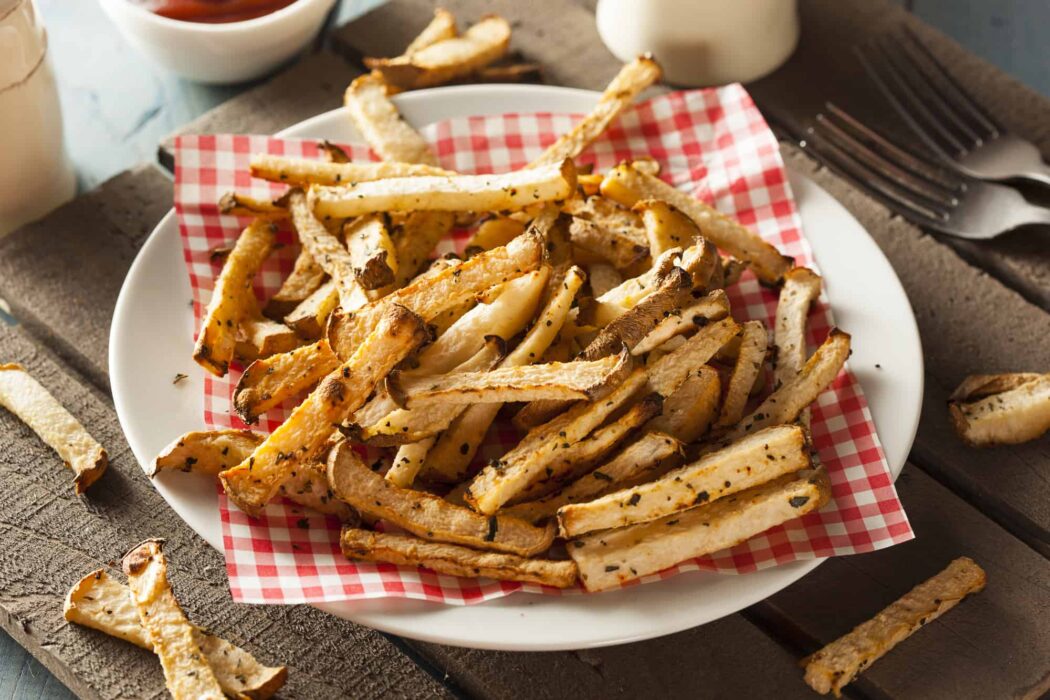
Conclusion
As you can see, while jicama is not a leafy green vegetable, you can easily add it to your keto menu at times. So yes, we can conclude that jicama is keto. This root vegetable has a moderate amount of net carbs, is high in fiber, and will not disrupt your ketosis.
Besides, jicama is high in vitamins and minerals that support your health during a high-fat diet. Try raw spiced jicama or make your keto French fries. I’m sure you will love this snack!